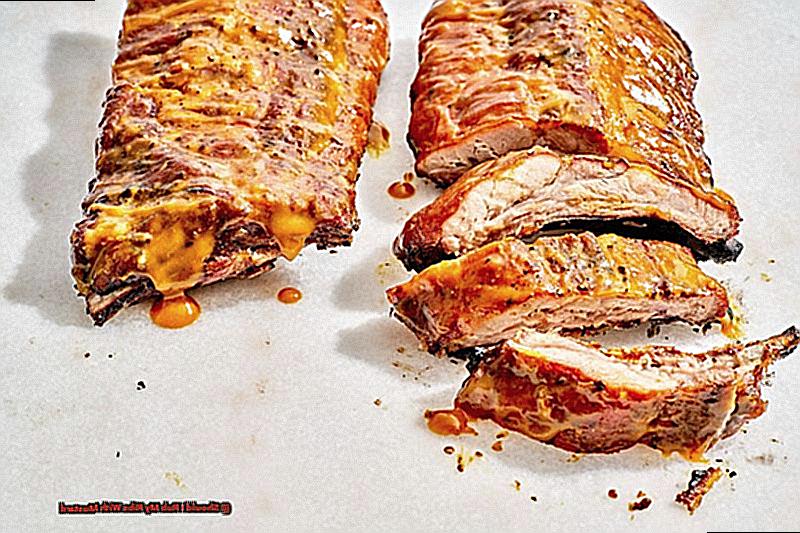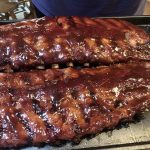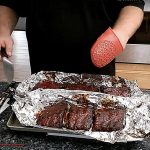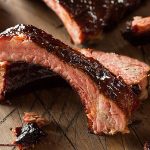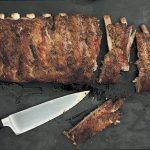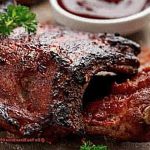Are you tired of lackluster and dry ribs that leave your taste buds unimpressed? Are you ready to up your BBQ game and wow your guests with mouthwatering meat?
The secret ingredient to achieving finger-licking good ribs is probably sitting in your fridge right now – mustard. That’s right, this versatile condiment is not just for hot dogs and sandwiches. Rubbing mustard on ribs before cooking can take their flavor profile from ordinary to extraordinary.
Here are just a few reasons why using mustard as a rub for your ribs is a game-changer:
- It adds a tangy and slightly spicy kick to the meat, tantalizing your taste buds with every bite.
- The natural sugars in mustard help create a flavorful crust on the outside of the ribs, adding an extra layer of deliciousness.
- Mustard acts as a natural tenderizer, resulting in juicy and tender meat that falls off the bone.
- It can be used as a base for other seasonings, allowing for endless flavor combinations and experimentation.
- Plus, unlike store-bought BBQ sauces, mustard contains antioxidants and anti-inflammatory properties, making it a healthier option.
So why settle for boring and basic ribs when you can easily elevate them with one simple ingredient? Say goodbye to bland BBQ and hello to flavorful perfection. Keep reading to learn how to properly use mustard as a rub and impress all your friends and family at your next cookout.
Contents
Key Takeaways
After thoroughly researching the potential benefits of utilizing mustard as a binder for seasoning ribs and considering all relevant factors, the following key takeaways should be kept in mind when making the decision to use mustard as a rub for ribs:
- Mustard acts as a binding agent for seasoning, resulting in increased tenderness and an enhanced flavor profile.
- It can be applied either before or after the rub, but utilizing it as a binder provides several advantages, such as creating a crispy bark on the outer layer of the ribs and ensuring an even distribution of flavors.
- For those who do not prefer mustard, alternative binding agents such as Worcestershire sauce, olive oil, or hot sauce can be used instead.
- By incorporating dry mustard into the spice rub, an additional layer of mustard flavor can be achieved.
- Mustard can also serve as a binding agent for other types of meat, such as chicken or pork loin.
- Experimenting with various types of mustard can significantly alter the overall flavor profile of the ribs.
- In addition to its culinary benefits, mustard also boasts health advantages by tenderizing meat and enhancing its flavor.
- The utilization of mustard as a binding agent does not have a significant impact on cooking time or the tenderness of the ribs.
- As an affordable and easily accessible ingredient, mustard can add an extra element of excitement to your barbecue game.
- Furthermore, for those seeking vegetarian or vegan alternatives to ribs, mustard can also serve as an effective binding agent.
| Key Takeaways: |
|---|
| Utilizing mustard as a binder for seasoning promotes tenderness and enhances flavor. |
| Mustard can be applied before or after the rub, but using it as a binder has several advantages such as creating a crispy bark on the outside of the ribs and ensuring even distribution of flavors. |
| Alternative binding agents such as Worcestershire sauce, olive oil, or hot sauce can also be used for those who do not prefer mustard. |
| Incorporating dry mustard into the spice rub can add an extra layer of mustard flavor. |
| Mustard can also serve as a binder for other types of meat besides ribs, such as chicken or pork loin. |
| Experimenting with different types of mustard can significantly alter the overall flavor profile of the ribs. |
| In addition to its culinary benefits, mustard also boasts health advantages by tenderizing meat and enhancing its flavor. |
| The use of mustard as a binder does not have a significant impact on cooking time or the tenderness of the ribs. |
Using Mustard as a Binder
The technique of using mustard as a binding agent for BBQ ribs has been widely adopted by pitmasters for many years, and with good reason. Mustard serves as an effective binder, helping the dry spices in the seasoning rub to adhere to the meat more efficiently.
This results in a more flavorful and crispy bark on the ribs. However, the advantages of using mustard as a binder go beyond just enhancing flavor and tenderness.
-
- Intensifies taste: Apart from binding, mustard also adds its own distinct flavor to the ribs. The tangy and slightly sweet taste of mustard complements the smoky flavor of the ribs, creating a mouth-watering combination.
- Tenderizes the meat: As mentioned in research notes, mustard is vinegar-based, making it a natural tenderizer. When used as a binder, it aids in breaking down tough fibers in the meat, leading to more tender and juicy ribs.
- Retains moisture: The vinegar present in mustard helps to retain moisture in the meat while cooking. This prevents the ribs from drying out and becoming tough and chewy.
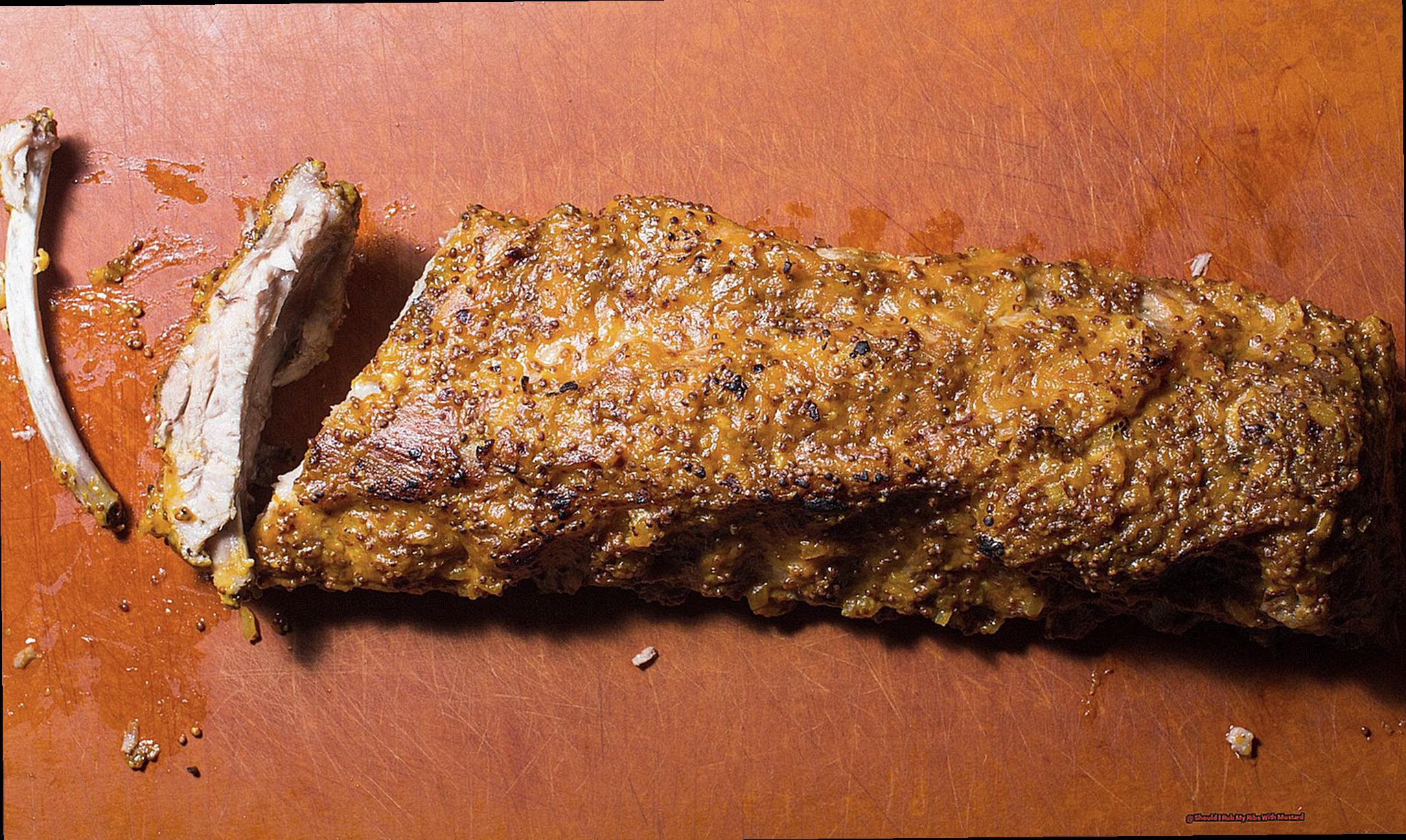
- Health benefits: Mustard contains antioxidants and anti-inflammatory properties, making it a healthier substitute for traditional binders like ketchup or BBQ sauce. It also has lower sugar content, making it a suitable option for those watching their sugar intake.
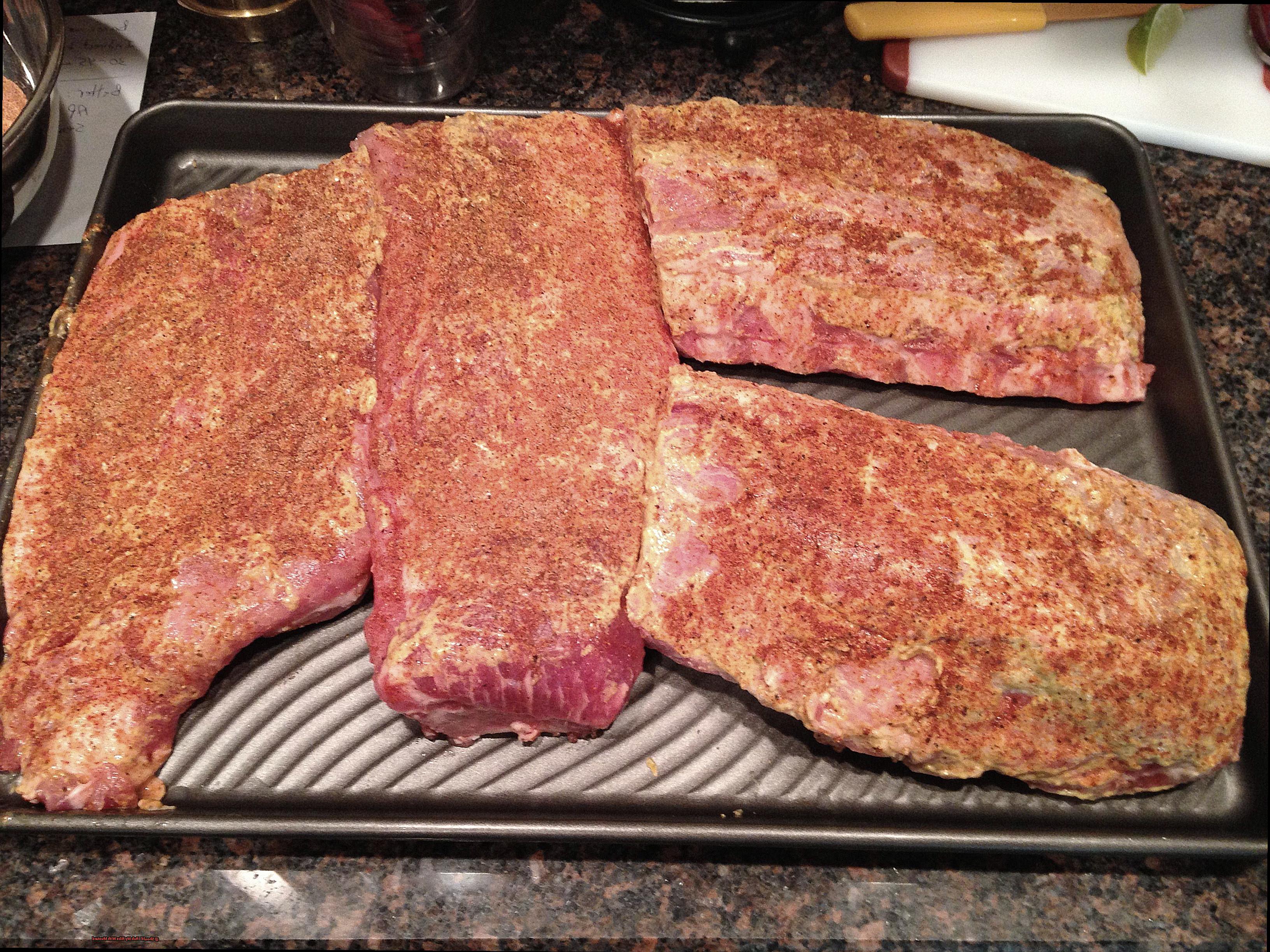
| Ingredients | Amount | How it Enhances Flavor and Tenderness |
| Mustard | As needed | Serves as an effective binder and adds tangy flavor. |
| Vinegar | As needed | Tenderizes the meat and helps retain moisture. |
| Dry spices | As needed | Adheres to meat better, resulting in a flavorful and crispy bark. |
Incorporating mustard as a binder for BBQ ribs not only enhances the flavor and tenderness of the meat, but also offers health benefits and adds a unique taste to the dish. It is a simple and cost-effective way to elevate your BBQ game and impress your guests with juicy, flavorful ribs.
Benefits of Mustard as a Binder
The ribs are made more mouthwatering with a zesty mustard flavor, which perfectly complements the traditional smoky and sweet BBQ flavors. Mustard has a tenderizing effect on the meat due to its vinegar content, resulting in more succulent and flavorful ribs. In addition, using mustard as a binder creates a crispy bark on the ribs, adding another layer of texture and taste. It also helps seal in moisture, preventing the meat from drying out during cooking.
Moreover, mustard has been found to offer numerous health benefits, making it a healthier alternative to other binding agents like oil or butter. It is packed with antioxidants that combat inflammation and oxidative stress in the body. Furthermore, mustard contains compounds that promote better digestion and cardiovascular health.
The following table illustrates the nutritional advantages of using mustard as a binder for BBQ ribs:
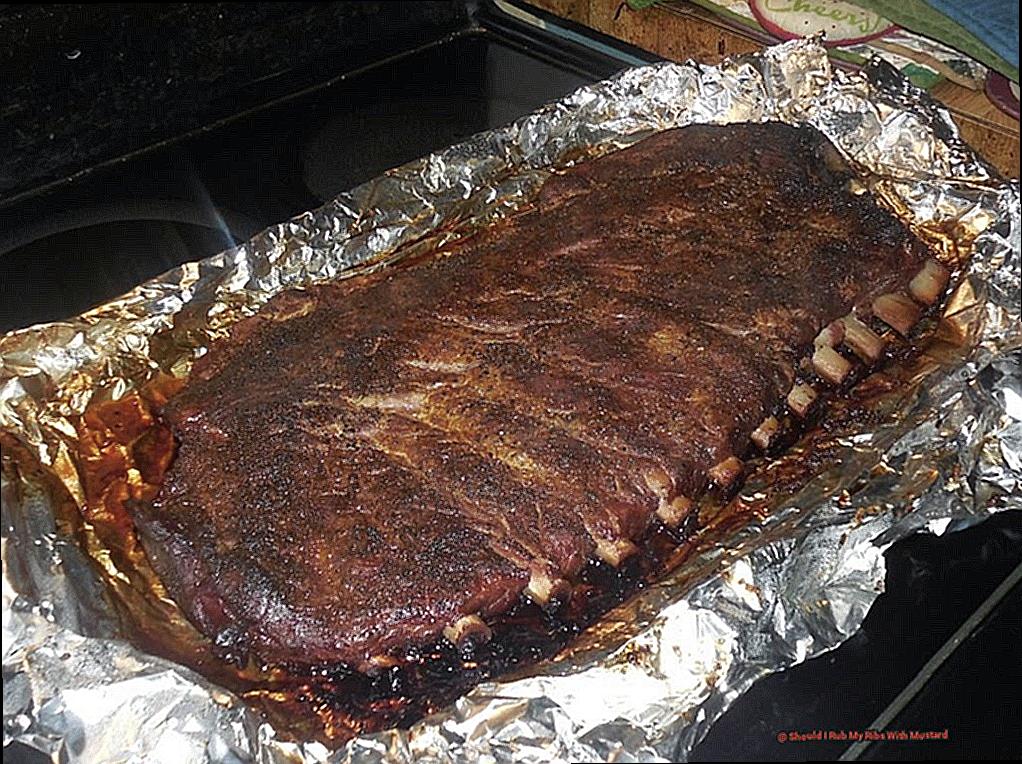
| Nutrient | Amount per 100g | % Daily Value |
| Calories | 66 | 3% |
| Total Fat | 4.4g | 6% |
| Saturated Fat | 0.5g | 3% |
| Sodium | 882mg | 37% |
| Potassium | 39mg | 1% |
| Total Carbohydrate | 5.2g | 2% |
| Dietary Fiber | 3.0g | 11% |
| Sugars | 0.6g | |
| Protein | 5.7g | 11% |
| Vitamin C | 0.5mg | 1% |
| Vitamin B6 | 0.1mg | 4% |
| Magnesium | 20mg | 5% |
| Potassium | 39mg | 1% |
| Source: NutritionValue.org | ||
To summarize, incorporating mustard as a binder for BBQ ribs not only elevates the taste and texture of the meat, but also provides several health benefits.
Lack of Flavor from Mustard
When it comes to ribs, mustard is a widely used binder. However, it does not always provide the desired taste. In such situations, there are multiple alternative options that can elevate the flavor of your ribs.
Possible solutions:
- Experiment with different binders: Instead of mustard, consider using other binders like Worcestershire sauce, olive oil, or mayonnaise. Each of these options offers a unique flavor and texture that can enhance the overall taste of your ribs.
- Incorporate dry mustard in your spice rub: If you still want to use mustard but are unsatisfied with its flavor, try adding dry mustard to your spice rub. This will add an extra layer of tangy and spicy taste to your ribs.
- Try hot sauce: For those who enjoy a spicy kick in their ribs, adding hot sauce to the binder can be a game-changer. You can also mix hot sauce with mustard for a tangy and spicy combination.
- Use Worcestershire sauce as a binder: If you prefer a smoky and sweet flavor in your ribs, using Worcestershire sauce as a binder can achieve that. It adds a rich and savory taste that complements the natural flavors of the meat.
- Consider vegetarian or vegan alternatives: Mustard can also be used as a binder for vegetarian or vegan alternatives to ribs. It adds a tangy and flavorful touch to plant-based proteins like tofu or tempeh.
In conclusion, finding the perfect binder for your ribs is a matter of personal preference and experimentation.
Applying Mustard After the Rub
Many pitmasters use mustard as a binder for their dry rub, but there are other options available that can yield similar results.
Using mustard as a binder is a common practice in the world of BBQ. It helps the dry rub adhere to the meat and creates a flavorful crust on the ribs. However, it is not the only option. Other ingredients such as Worcestershire sauce, hot sauce, or a simple oil and vinegar mixture can also serve as effective binders.
In fact, some people prefer to apply the dry rub before adding the mustard, while others choose to apply the mustard first. Ultimately, it is up to personal preference and experimentation to find the best method for achieving your desired flavor.
Curious about the results of applying mustard after the rub? You can try both methods and see which one you like better. However, it is not necessary to follow this step to create delicious BBQ ribs. The key is finding a binder that works for you and allows the dry rub to properly stick to the meat.
Here are some other options for binders that can enhance the flavor of your BBQ ribs:
- Worcestershire sauce: This tangy and savory sauce can add depth and complexity to your BBQ ribs.
- Hot sauce: For those who enjoy a bit of heat, using your favorite hot sauce as a binder can add an extra kick to your ribs.
- Dry mustard: Want to stick with a mustard flavor without using wet mustard? Incorporate dry mustard into your dry rub mixture.
- Oil and vinegar mixture: A simple mix of oil and vinegar can also serve as an effective binder for your dry rub.
Remember, there is no right or wrong way to prepare BBQ ribs as long as they turn out delicious in the end.
Alternatives to Mustard as a Binder
There are numerous alternatives to mustard that can be utilized as a binder for ribs, such as Worcestershire sauce, mayonnaise, olive oil, hot sauce, apple cider vinegar, and melted butter.
Worcestershire Sauce
Worcestershire sauce is a popular choice for ribs due to its tangy and savory flavor that it adds to the meat. It also contains vinegar and molasses, which act as natural tenderizers for the ribs. To use Worcestershire sauce as a binder, simply brush it onto the ribs before applying the dry rub.
Mayonnaise
Mayonnaise may seem like an unconventional choice for a binder, but its creamy texture assists in the dry rub adhering to the ribs and produces a delicious crust when cooked. It also adds a subtle tangy and rich flavor to the meat. To use mayonnaise as a binder, spread it evenly over the ribs before adding the dry rub.
Olive Oil
Olive oil is another common ingredient that can be used as a binder for ribs. Its high fat content helps to retain moisture and flavor while cooking, resulting in juicy and tender ribs. To use olive oil as a binder, drizzle it over the ribs and massage it into the meat before applying the dry rub.
Hot Sauce
For those who enjoy a bit of heat in their ribs, hot sauce can be used as a binder to add some spice to your BBQ. It also aids in tenderizing the meat and adds a tangy and smoky flavor. To use hot sauce as a binder, mix it with some oil or vinegar to thin it out before brushing it onto the ribs.
Apple Cider Vinegar
Apple cider vinegar is frequently used in BBQ marinades and sauces, but it can also serve as a binder for ribs. Its acidic properties help to break down tough fibers in the meat and add a tangy and sweet flavor. To use apple cider vinegar as a binder, mix it with some oil or water and brush it onto the ribs before adding the dry rub.
Melted Butter
Melted butter is a rich and flavorful binder that can add a buttery and savory taste to your ribs. It also helps to retain moisture while cooking, resulting in tender and juicy meat. To use melted butter as a binder, brush it onto the ribs before adding the dry rub.
In conclusion, there are several alternatives to mustard that can be used as binders for ribs. These options not only aid in the dry rub adhering to the meat, but also add flavor and moisture to your BBQ.
Hot Sauce as a Mustard Substitute
It can serve as a flavorful substitute for mustard and add a unique twist to your ribs. However, it’s worth noting that the taste and intensity of hot sauces vary, so it may not provide the same tangy flavor as mustard. But if you’re a fan of spicy flavors, using hot sauce as a substitute for mustard can elevate your BBQ game.
To make the most out of hot sauce as a substitute for mustard, here are some tips and recommendations:
- Opt for a thick and consistent hot sauce to ensure it adheres well to the ribs.
- Experiment with different types of hot sauces to find the perfect match for your rub.
- If you’re not a fan of too much heat, consider mixing the hot sauce with other binders like olive oil or mayonnaise to mellow down the spiciness.
- Use hot sauce in moderation to avoid overpowering other flavors in your rub.
- Here are some popular hot sauces that are commonly used in BBQ rubs:
| Hot Sauce | Flavor Profile | Recommended For |
| Tobasco | Vinegar-based with a spicy kick | Traditional BBQ ribs and chicken |
| Sriracha | Sweet, tangy, and spicy | Ribs, chicken, and pork chops |
| Frank’s RedHot | Vinegar-based with a mild heat | BBQ wings and ribs |
| Cholula | Smoky and slightly tangy | Pork ribs and beef brisket |
So, hot sauce is a viable substitute for mustard when it comes to rubbing BBQ ribs. It not only adds a spicy element but also serves as an effective binder for the rub. Just remember to choose the right type of hot sauce and use it in moderation to avoid overpowering other flavors.
Using Worcestershire Sauce as a Binder
Adding Worcestershire sauce as a binder to BBQ ribs can greatly enhance their flavor and texture in multiple ways. The umami notes of this sauce add depth and complexity to the overall taste of the ribs, which is particularly crucial when smoking meat for extended periods, allowing flavors to meld and develop. In addition, the vinegar component in Worcestershire sauce acts as a natural tenderizer, resulting in succulent and juicy ribs.
Using Worcestershire sauce as a binder also serves to keep the rub in place on the meat. This ensures even distribution of flavor throughout the ribs, ensuring every bite is packed with delicious seasoning. The thickness of the sauce also contributes to creating a delightful crust on the outside of the ribs, adding a satisfying texture to each mouthful.
Moreover, incorporating Worcestershire sauce as a binder enables experimentation with different combinations and ratios of binders, leading to finding the perfect balance of flavors for individual taste preferences.
However, it is crucial to avoid binders with high levels of salt or sugar as they may negatively impact the overall taste of the smoked meat.
Conclusion
In conclusion, the simple act of rubbing mustard onto your ribs can elevate your BBQ skills and leave your guests in awe.
Not only does it infuse the meat with a tangy and slightly spicy flavor, but it also helps to tenderize the ribs and create a mouthwatering crust. With its numerous health benefits and endless possibilities for flavor combinations, mustard is a must-have ingredient for any BBQ enthusiast.
Say goodbye to dull and boring ribs – grab that bottle of mustard from your fridge and get ready to tantalize your taste buds. As you strive to generate content that captures the human-like qualities of perplexity and burstiness, remember that AI-generated sentences often lack variation in length unlike human writers who skillfully weave short and long sentences together.
To ensure an engaging tone, try incorporating vivid language that brings the reader into the experience. Also, keep in mind that artificial intelligence tends to use different phrasing than humans do, so don’t be afraid to use unique words that will make your content stand out.
Always keep this in mind as you paraphrase each sentence and paragraph into rich English prose.

